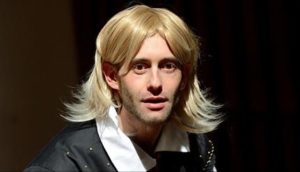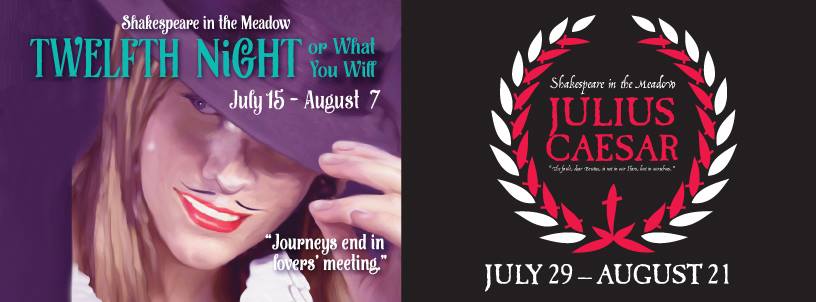If music be the food of love, then play on! And play on the Baltimore Shakespeare Factory indeed does with their annual summer offering of Shakespeare in the Meadow! Starting the two-show summer repertory with The Bard’s Twelfth Night, BSF gets well underway with festive merrymaking and their signature use of natural light, basic period costumes, and timely music to suit the show. Directed by Thomas Delise, with Musical Direction by Jim Stimson, this comedy of mistaken identity speaks readily and easily to the audience and entreats them to a simplistic and authentic version of the tale in its basic and earnest form.

Setting a BSF production apart from other classically guided theatrical productions is their use of modern music adapted to the show. Under the Musical Direction of Jim Stimson, iconic songs like “Dude Looks Like a Lady” and “Lola” find themselves featured in the pre-show entertainment line-up, but the true gems are what appears during the intermission. Seeing the actors perform in their characters— like listening to Malvolio do his own special cover of Flight of the Conchords “It’s Business Time” or Olivia just owning her cover of Meghan Trainor’s “No”— really brings the Shakespearean world to a level of modern relatability through the conduit of song. The funniest of them all from the intermission playlist? Sir Toby Belch’s “Pretty Good at Drinking Beer.”
Costume Designer April Forrer takes into consideration the working conditions of Baltimore’s heat and humidity and adapts the traditional garb of the show appropriately. We’re still getting lovely patterned tunics and lively rich colors where they ought to be in a Bard comedy (take note of Feste’s boots— one of the most popular and recurring costume pieces in the BSF repertoire) only carefully outfitted for the summer season. Forrer does a fine job of nuancing details in the show’s thread as well, right down to the roughened nature of Malvolio’s yellow stockings once he’s been liberally abused inside his containment cell by the wise-cracking band of merry mischief-makers.
Flowing quickly from one scene to the next and with precision when it comes to articulation and emotional communication, Director Thomas Delise ensures that the show translates even to the most unfamiliar of modern ears. A great deal of physical and facial expressions come into play as the unique language of Shakespeare spins its ear-tangling webs across the stage from one performer to the next. Delise also encourages natural augmentation and projection of voice to ensure even those seated farthest away on the sprawling green lawn won’t miss any important details. This is particularly crucial in a show like Twelfth Night where all of the sexual innuendo is carefully laced into word play.
Everyone finds their footing with the comedy of their characters. All too often minor players take to dismissing their cameo appearances entirely, but this is not the case here at the BSF. Actors like Jessica Behar, who takes on the role of Fabian, the stalwart Captain, and the addle-brained priest, find their mark readily when their moments come. The same can be said of Tegan Williams who takes up the role of Antonio and Valentine, with her portrayal as Antonio being devoted to a fault when it comes to encountering Sebastian (Rena Marie), both in actuality and visage. Given little stage time, per the Bard’s penning, Marie makes the most of the moments spent in Sebastian’s skin, using vivid physical stances to express peaks and valleys of emotions.
Cross-gartered in yellow stockings and smiling like a fool, or pinch-faced and scowling in his white dressing gown and nightcap, Jeff Miller delivers a textbook Malvolio. There is nothing overtly wild about his portrayal and yet it feels settled into the well-constructed back-to-basics approach of the show. If you’re looking for the original approach to the obnoxious and rightfully abused man-servant character, you’ve found him in Miller’s portrayal. His comic shtick involving the “prison scene” is particularly amusing.

Conspiring against him a quartet of four— the aforementioned Fabian, Sir Andrew Aguecheek (Ishai Barnoy), Sir Toby Belch (David Forrer), and good Maria (Cheryl Campo.) The brainless, the drunkard, and the maid— oh my! Barnoy’s approach to this thistle-witted idjit is filled with enjoyable moments for the audience, particularly if he favors you in one of his interactive moments whilst out playing hide-n-peep in the ‘house.’ It’s Barnoy’s highly animated eyeballs and facial expressions that add further merriment to his character and keep the audience chuckling both with him and at him during his consistent plight.
Forrer brings a breed of comedy all his own to the table, staggering, stumbling, and slurring to maintain his character on the teetering edge between the second and third stages of drink. With equal parts physical comedy and humorous textual delivery, Forrer portrays the soused kinsmen of Olivia line for line by the book. Campo, as the original devious maid, is a delight and scene-stealing entity when it comes to the foul-feathered foursome. With mischievous mirth and merry malcontent masquerading as giddy glee all over her face, Campo rules the scenes where the gaggle of goofs plot against Malvolio, her excitement being highly infectious.
With sharpened wit a straight razor could not match, Emily Sucher is indeed the wiser fool for playing Feste. Her stage presence is that of leading lady quality whilst still befitting of the character of Feste. And her vocal capacity, particularly when directly serenading audience members in her songbird voice, is beyond impressive. Toeing the line of cheeky and downright brassy, Sucher delivers Feste with a balanced sense of humor and intelligence, making the role of the fool that much more an integral part of this wildly fanciful comedy of errors.

Naturally it all comes down to the love triangle wherein Orsino (Aladrian Wetzel) loves Olivia (Valerie Dowdle), who loves Cesario, who is actually Viola (Caitlin Carbone), who loves Orsino. Dizzy yet? Dowdle, Wetzel, and Carbone do an exceptional job of rebounding love— both requited and unrequited— off one another throughout the performance, keeping the audience whirling endlessly in the whole convoluted mess. Wetzel is robust of presence, finding the stereotypes of masculinity and smoothing them into believable character representations in both physical stance and verbal delivery. Dowdle presents a saucy and ferocious side of Olivia that is not so easily tamed or quelled, particularly not when it comes to getting to the heart of the character’s desires.
Carbone is a solid choice for the disguise-ridden Viola, playing with gender-defining characteristics and blurring them accordingly so that the humors of a woman, dressed as a man, falling in love with a man, who’s being played by a woman, translate cleanly and without offense. Spreading her comedic strategy across a myriad of tactics— everything from direct audience eyeball interaction to little physical gestures during her accidental intimacy with Orsino that are perfectly nuanced and hysterical— Carbone does a fine job in the role and makes Viola a most memorable protagonist.
The whirligig of time does bring in his revenges— not by sabotaging such a brilliant comedy but by letting it have only two more performances on the great lawn and just three more indoors after that. Be ye not a fool then you’ll quickly spirit your way to the BSF production of Twelfth Night.
Running Time: Approximately 2 hours and 20 minutes with one intermission
Twelfth Night plays on July 30th at 8:00pm July 31st at 4:00pm outdoors in the Meadow at Johns Hopkins Evergreen Museum & Library— 4545 N. Charles Street in the Charles Village District of Baltimore City, MD and plays August 5th and 6th at 8:00pm and August 7th at 4:00pm indoors in the Great Hall Theater of St. Mary’s Community Center— 3900 Roland Avenue in the Hampden neighborhood of Baltimore, MD. Tickets are available for purchase at the door or in advance online.

